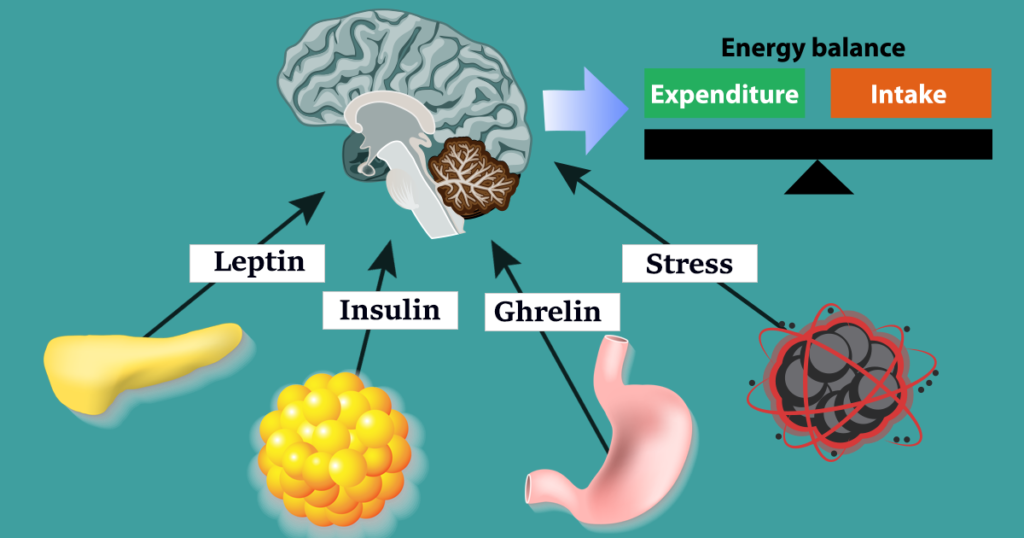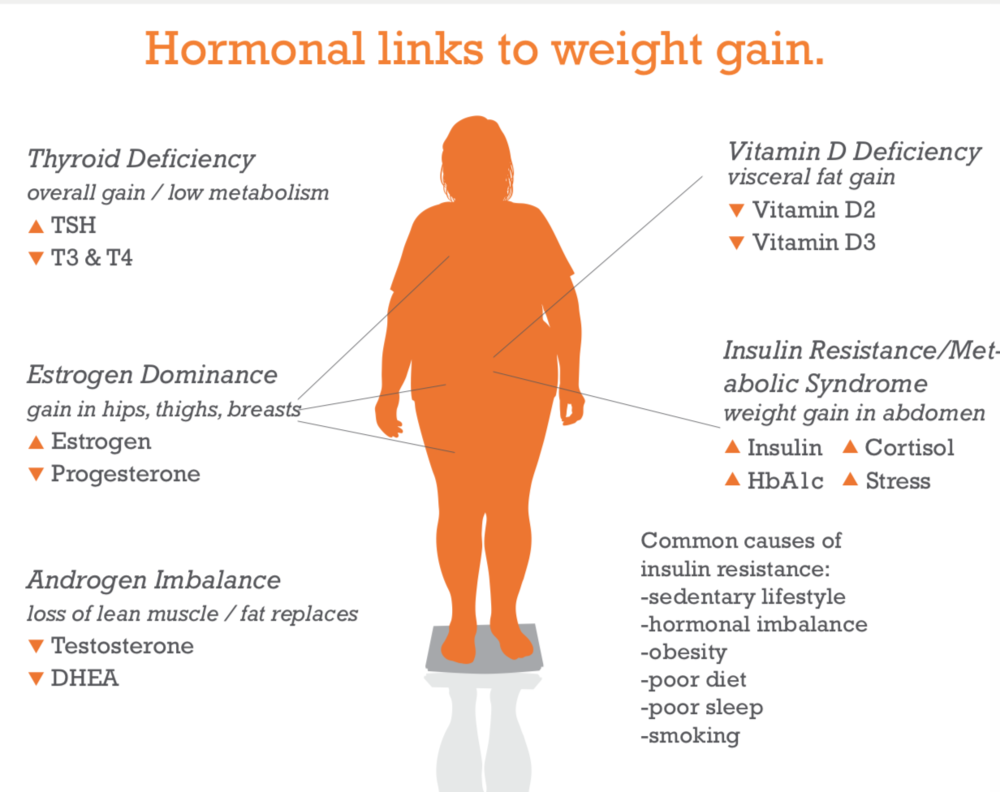
Being overweight often has nothing to do with calories or exercise. For a huge number of us, the problem is misfiring hormones. But seeing how this revelation has helped my patients and I slim down and feel better gives me confidence that it’s true for most women who are trying to lose weight and can’t. You already know about some weight-affecting hormone issues, like thyroid and insulin imbalances. But more subtle ones could also be keeping you from the body you want. Here are some other ways your hormones might be causing weight gain.
Following are the hormones that control your weight.
1. Insulin
Insulin is a hormone produced by the beta cells of your pancreas. Insulin allows your cells to take in blood sugar for energy or storage. Insulin is also the main fat storage hormone in the body. When cells are insulin resistant (very common), both blood sugar and insulin levels go up significantly.
Chronically elevated insulin levels, can lead to many health problems, including obesity and metabolic syndrome. Overeating — especially sugar, refined carbohydrates, and fast food — drives insulin resistance and increases insulin levels
Here are some tips to normalize insulin levels and improve insulin sensitivity:
- Avoid or minimize sugar:
- Reduce carbohydrates: A low-carb diet can cause an immediate drop in insulin levels
- Fill up on protein: Protein actually raises insulin in the short-term. However, it should lead to long-term reductions in insulin resistance by helping you.
- Include plenty of healthy fats: Omega 3 Fats found in fatty fish can help lower fasting insulin levels.
- Exercise regularly: Walking is the best exercise for IR.
- Get enough magnesium: Insulin resistant people are often low in magnesium, and magnesium supplements can improve insulin sensitivity
- Drink green tea: Green Tea may lower blood sugar and insulin levels
- 1 tsp of methi seeds (soaked overnight) or ½ tsp cinnamon powder with water on an empty stomach in the morning helps in sugar metabolism

2. Leptin–
Leptin is produced by your fat cells. It’s considered a “satiety hormone” that reduces appetite and makes you feel full. As a signaling hormone, its role is to communicate with the hypothalamus, the portion of your brain that regulates appetite and food intake.
People who are overweight or obese usually have very high levels of leptin in their blood. This is referred to as leptin resistance. When leptin signaling is impaired, the message to stop eating doesn’t get through to the brain, so it doesn’t realize you have enough energy stored. Two potential causes of leptin resistance are chronically elevated insulin levels and inflammation in the hypothalamus .
Here are a few suggestions for improving leptin sensitivity:
- Avoid inflammatory foods: Limit foods that causes inflammation especially sugary drinks and trans fats.
- Eat certain foods: Eat more anti inflammatory foods, such as fatty fish.
- Exercise regularly: Moderate activity can improve leptin sensitivity.
- Get enough sleep: Studies have shown that insufficient sleep leads to a drop in leptin levels and increased appetite
- Supplements: In one study, women on a weight-loss diet who took alpha-lipoic acid and fish oil lost more weight.

The so-called stress hormone cortisol can create all kinds of trouble for women who want to shed weight. When cortisol rises, it encourages the conversion of blood sugar into fat for long-term storage. However, chronically elevated levels of cortisol can lead to overeating and weight gain.
These strategies can reduce cortisol levels:
- Balanced diet: Follow a balanced, real food-based diet. Don’t cut calories to extremely low levels.
- Meditate: Practicing meditation can significantly reduce cortisol production).
- Listen to music: Researchers report that when soothing music is played during medical procedures, cortisol doesn’t rise as much.
- Sleep more: One study found that when pilots lost 15 hours of sleep over the course of a week, their cortisol levels increased by 50-80% Bottom of Form
4 TSH- Thyroid stimulating hormone
Thyroid hormones heavily influence your metabolism, your body temperature, and your appetite regulation. Your thyroid works closely with your hypothalamus, a small area of your brain, to maintain both your weight and your energy balance—what’s left after you eat and your body uses the calories it needs.
Healthy Suggestion to control thyroid:
- Ø People with hypothyroidism may want to consider minimizing their intake of GLUTEN a protein found in foods processed from wheat, barley, rye, and other grains.
5. Estrogen
It is the most important female sex hormone. It is mainly produced by the ovaries and is involved in regulating the female reproductive system. Both extremely high and low levels of estrogen can lead to weight gain. This depends on age, action of other hormones, and overall state of health.
To maintain fertility during the reproductive years, estrogen starts promoting fat storage at puberty. That’s why weight gaining during onset of menses in teenage girls is very common. Additionally, it may stimulate fat gain in the first half of pregnancy.
During menopause, when estrogen levels drop because less is produced in the ovaries, the site for fat storage shifts from the hips and thighs to visceral fat in the abdomen. This promotes insulin resistance and increases disease risk

These nutrition and lifestyle strategies can help manage estrogen:
- Fiber: Eat plenty of fiber if you want to reduce estrogen levels
- Cruciferous vegetables: Eating cruciferous vegetables like Bok choy, Broccoli, Brussels sprouts,Cabbage, Cauliflower & Collard greens.
- may have beneficial effects on estrogen.
- Flax seeds: Although the phytoestrogens in them are controversial, flax seeds appear to have beneficial effects on estrogen in most women
- Exercise: Physical activity can help normalize estrogen levels in both premenopausal and postmenopausal women
Hormones work together to increase or decrease appetite and fat storage. If the system doesn’t work properly, you may find yourself struggling with weight issues on an ongoing basis. Fortunately, diet and lifestyle changes can have powerful effects on these hormones.
To get a detailed guidelines or a personalized plan for your health problems you can contact directly, In the pandemic my online consultations are on Contact details mentioned below, Happy to help always.

